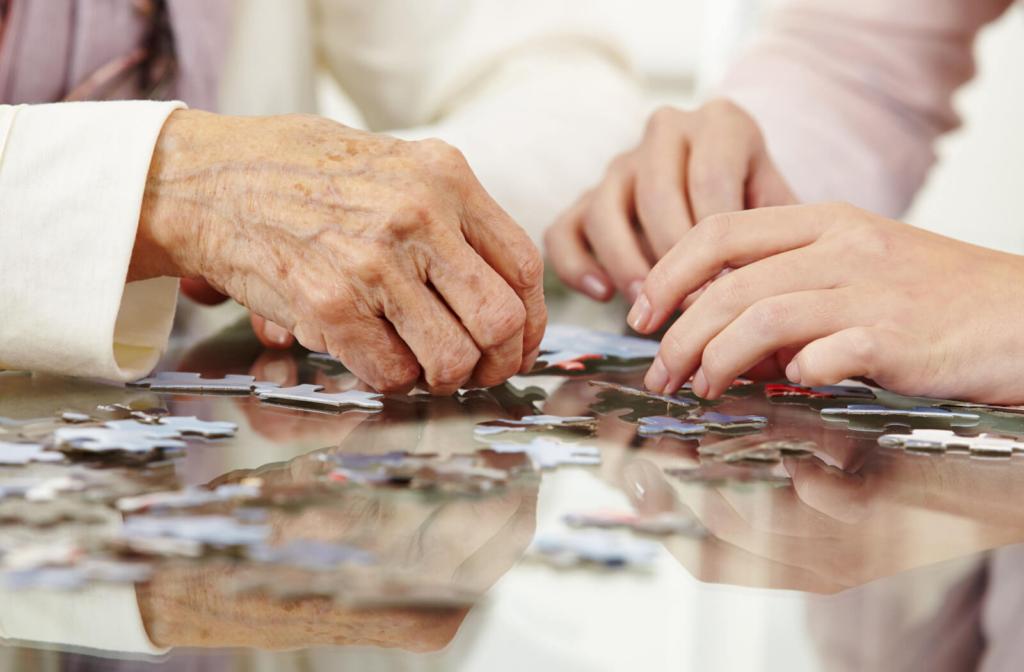Key Takeaways
- Signs of emotional struggles, behavioral changes, and confusion all point to a need for memory care
- Physical changes, wandering, and challenges with daily activities often imply a person needs professional support
- Caregiver stress means family members are taking on too much themselves, which can quickly lead to long-term burnout
- Memory care eases the burden on families by offering preventive care and professional support to older adults in need
When someone you love begins to show signs of memory loss, it can be challenging to know what’s next. You may notice small changes, like forgotten names, misplaced items, or unusual behavior.
Sometimes, these are minor problems, but other times, these early signs can quickly affect your loved one’s dignity, safety, and quality of life.
If you notice your loved one’s cognitive changes are affecting their everyday life, it’s time to think about memory care.
With focused care, your loved one can get the support they need to address the unique challenges they face every day, making life safer, more convenient, and more dignified.
1. Emotional Struggles & Isolation
Changes in mood or emotional withdrawal are often early indicators of memory loss. You may notice your loved one losing interest in hobbies or showing signs of depression or anxiety. An emotional shift isn’t always obvious at first, but it tends to grow over time.
A structured memory care community can help by providing both consistency and meaningful opportunities for social interaction. Group activities, familiar routines, and warm, attentive staff can help reduce feelings of loneliness every day.
A community built on a deep understanding of how dementia affects emotional and mental health can help reintroduce joy and connection to your loved one’s life.
2. Wandering & Safety Concerns
Wandering is one of the more noticeable and worrisome signs of cognitive decline. A loved one may leave the house in search of something from the past or because they’re unsure of where they are. They may forget why they left—or how to get back.
In many cases, wandering is triggered by disorientation rather than a deliberate decision. The behavior can be stressful for families.
However, memory care homes have techniques and safety features to prevent wandering without compromising autonomy. Communities like ours offer numerous safety features, such as secure entrances and exits, to keep your loved one safe.
3. Behavioral Shifts
Sudden changes in behavior may point to underlying memory care needs. While everyone has off days, patterns of mood swings, agitation, or personality changes can signal something more.
For example, a loved one who was once outgoing might become irritable, withdrawn, or even confused during social events.
Memory care communities are uniquely suited to help here. Every caregiver steps in to provide your loved one with empathetic and patient care.
Caregivers are trained to recognize triggers, not just the symptoms. Then, they work hard to respond in ways that ease discomfort and build trust.
4. Struggles with Daily Activities
Over time, daily tasks can become a source of stress and confusion for someone with memory challenges. Activities such as bathing, dressing, preparing meals, or taking medications may feel overwhelming or be forgotten altogether.
When these tasks are left unmet, they can lead to more significant health concerns.
Fortunately, memory care creates a consistent daily routine to make life easier, more predictable, and more convenient. Through a personalized care plan, your loved one will always have access to the support they need.
5. Persistent Confusion & Disorientation
When someone becomes confused about time, place, or people, it can be a sign of progressive memory loss.
You may notice your loved one asking the same question repeatedly or becoming distressed in unfamiliar places. They might confuse one family member for another or struggle to follow a simple routine.
Memory care communities intentionally design environments to support orientation and comfort. Personalized routines and familiar layouts help reduce confusion and create a sense of predictability.
Staff use gentle redirection techniques to help your loved one stay grounded without feeling corrected or overwhelmed.

6. Physical Health Decline
Cognitive decline often goes hand in hand with changes in physical well-being. You might notice unexplained bruises from falls, reduced hygiene, or general weight loss. In some cases, a person may not even realize they’ve fallen or bumped into something.
Catching these signs early on is key to preserving your loved one’s health and quality of life.
Memory care offers built-in support for physical health. Communities offer gentle exercise options, such as chair yoga and low-impact fitness sessions, to help residents stay healthy.
Many communities also work with visiting physicians or healthcare partners to help manage chronic conditions.
7. Caregiver Burnout & Stress
As a caregiver, your love and effort matter deeply. However, even the most dedicated caregivers feel a toll over time. Caregiving requires a significant level of emotional, mental, and physical energy, and without support, burnout becomes a real problem.
If you’re struggling to handle everything on your own, it’s time for a change.
A move to memory care means your loved one can gain professional support while you step back. You can focus on making every moment matter with your loved one—not on pushing yourself harder every day.
Give Your Loved One the Care They Deserve
Supporting your loved one emotionally isn’t always about big changes. Sometimes, it’s about small comforts repeated regularly. That’s where a community setting often shines.
Here in our community at Liana of Venice, we’re always happy to help you explore what support looks like for your loved one. Schedule a tour with us today to discover how we can support your family to experience the care they deserve.




